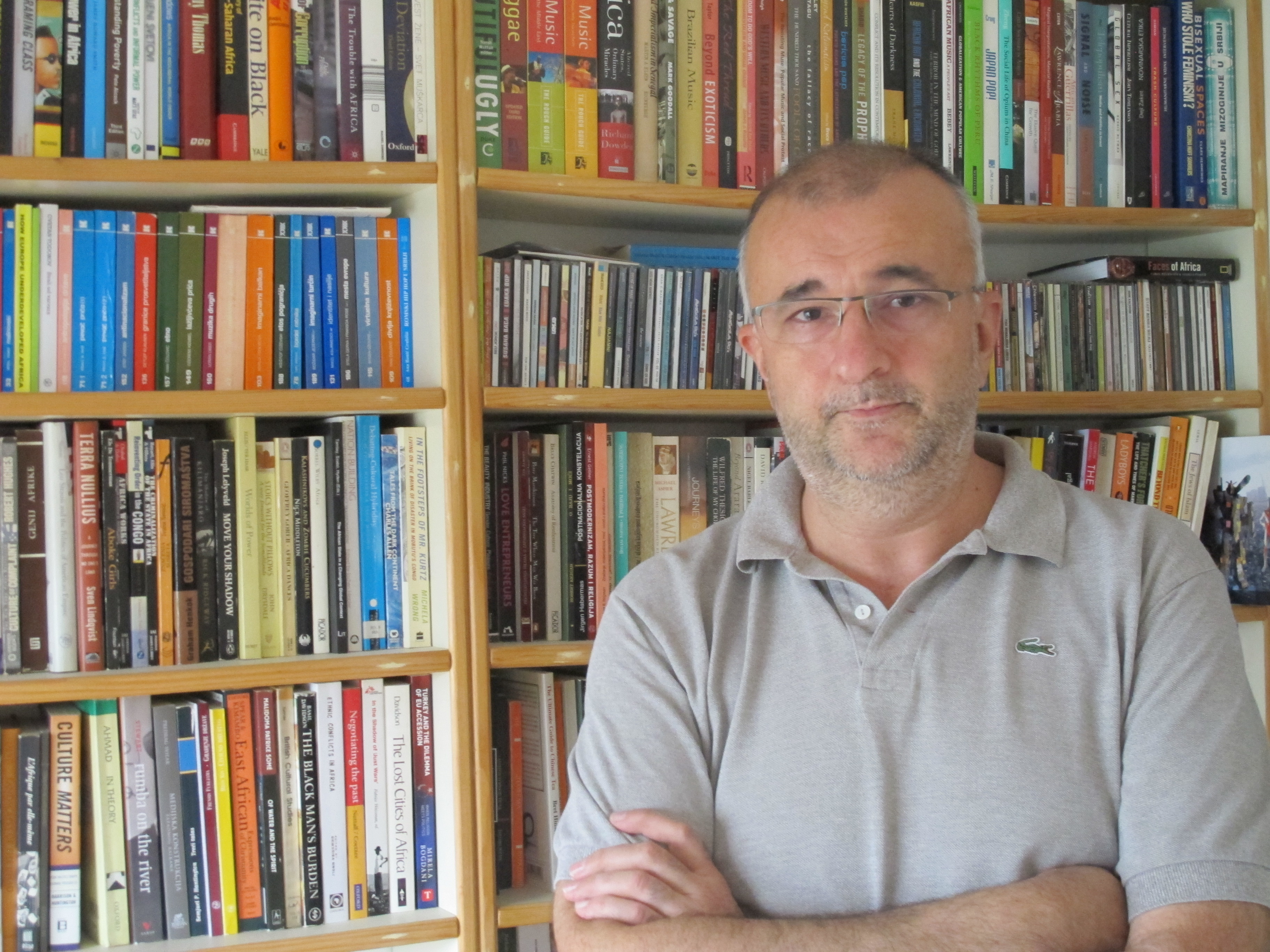Text: Žikica Milošević
One of the sharpest minds of Serbian journalism, Zoran Ćirjaković, explains his views on the differences in mentalities, the roles of China, India, Russia, America and the global balance or disbalance of powers in this, ever more unpredictable, world of ours

- The clash of civilisations gave way to the imperial conflicts, where belonging to a civilisation may or may not mean that the country will be on the “right side”. Will this be resolved by “several small conferences”, as it would be in Astana between Russia, Turkey and Iran, which is dedicated to peace in Syria?
I do not think we should think in terms of solutions. As it usually happens in human history, this time, what brought us into this global chaos and madness which has no end in sight is the hybris, a virus that attacks almost exclusively powerful people. Tectonic disorder has been started by, to put it mildly, reckless US invasion of Iraq in 2003. How will end this tragedy started by George “Dubya” Bush and a handful of his neoconservative advisers infected with hybris and sweet illusion about the end of history, it is impossible to predict. After all, futurology has proven to be the most wrong of all sciences. History is much better, although not infallible teacher. It teaches us that the main “challenger”, the country that first struck the unipolar, Washington-centred world, and that is Russia, is unlikely to pick the cream of their present success.
- What can we from the Balkans expect from the “rapprochement” of Russia, Turkey, and Israel and possibly the United States?
The Balkans are important to the Great powers only when they are in chaos and when they produce history in the area that is uncomfortably close to all more fragile and nervous, but still strong, Western Europe, the former centre of the world that are not easily released from illusion. The year 2016 was a revolutionary, one of those rare years in human history when happens what we thought was impossible. Revolutions are usually unpredictable even in strategically more important areas, let alone to a put aside, little important Balkans. I fear that the “fate” of Serbia will be much more dependent on the sheer luck and on today unpredictible events, “the unknown unknowns”, as turbo cynical Donald Rumsfeld said, than on tactical and strategic decisions of local leaders.
- Is the world closer to “a new bloc division of interests” as defined by Orwell in “1984”? Eurasia as a zone of Russian influence, Eastasia as a Chinese zone, and Oceania, which includes the Anglo-Saxon world, led by America and Britain, which, as in Orwell’s predictions, left the continent to turn to Atlantic and Commonwealth alliances?
As I said, I grow a huge skepticism towards futurology, hence I would not try my luck in that dicipline. I’m surprised you’re not mentioning the Islamic world, which holds a key position ever since history returned from a short “vacation”. History is today written by “small people”, and the the key role is taken by Muslims, people willing to die for ideas, guided by the seductive, egalitarian belief that is mixed in all. Moreover, today I am much more moved, more than by genius Orwell, by sharp and concise thought thinking of Sheikh Ahmed Yassin, the assassinated Hamas founder: “When all the doors are bolted, Allah opens the gate”. What is hidden on the other side of the gate is what are trying to open the believers for which many believed that would never be in a position to be asked anything, let alone to open or close a thing. We will discoverer it during the long and unpleasant years to come. The key here is that whenever we judge the monstrous crimes and terrorist attacks, we should not lose sight of who was the one in past centuries who sowed the seeds of this tragedy, when they they drew the state borders, crowned rulers and saved rotten regimes. Sykes, Pikot, Durand… surnames of impersonal Western diplomats are just symbols of the unbearable ease with which the West have moulded the modern world.
- In the atmosphere of neo-colonialism when the former colonial powers wanted only to draw profit from Africa, while investments have been conditioned by the political changes in the countries, China is emerging as a serious investor which is forming the continent as one of its underdeveloped province: building cities of apartment blocks, the tram in Addis Ababa… will Africa be the Chinese sphere of influence in the future, because others left a vacuum? Is African mentality easy to be reshaped?
It is true that China has no colonial ambitions in Africa, and the Chinese are too insular to be able to turn sub-Saharan Africa into its sphere of influence on the way it was done at the beginning of the 20th century by Western European powers. The main problem is that economic exchanges between China and the countries of sub-Saharan Africa, its structure does not differ much from those that characterised the relations between the Western colonial powers and former colonies. Exports of raw materials and imports of consumer goods does not constitute a development based on anything very promising. Nevertheless, it is encouraging that there is interest of China to invest in large infrastructure projects of the energy and, although on the majority of new roads it is more likely that you will see goats than vehicles. China will remain an important role model and an alternative, a country that will allow African leaders to lead a more independent policy. As far as the mentality, the mentality of each nation is difficult to change, although sub-Saharan mentality is much easier to be changen than Serbian, which is one of the few hardest mentalities to change in the world. If it’s any consolation, since we are on this issue, even “worse” are the Greeks and Portuguese.

5. What makes our mentality so hard to change?
Unfortunately, everywhere, including our country, people tend to mistake a change of clothing styles and a more sophisticated way of expression with a change of mentality. Although I, as a lecturer of Theory and practice of intercultural communication, spent a lot of time devoted to the study of African and other mentalities and misunderstandings caused by cultural differences, still I am most fascinated by our mentality. In its last incarnation, our great fear of uncertainty, and that is the greatest enemy of any change of mentality, has mutated in the holy trinity “relaxed, chill out, play it safe” but its previous avatar, “state service“, had not lost its attraction. We shouldn’t forget that neoliberalism, which has been governing the world since the victory of Thatcherism and Reaganism, is not culturally neutral system. Our west Balkan cultural pattern, what is colloquially usually called mentality, is one of the least compatible patterns with neoliberalism, the Anglo-Saxon creation. After all, when we mentioned Africa, it is not surprising that today the former British colonies are far more prosperous than the French ones, which experience less bloodshed.
- Can we expect the times of “strong men” and “deals” from Donald Trump, as in the time of Nixon and Kissinger, who have “opened China”.
Probably it would be a great success was if he managed to open up Russia a bit. “Opening” sounds ambitious. Although between Russia and the United States there are no longer has those key ideological differences that marked the Cold War, the gap seems quite insurmountable. When it comes to authoritarian leaders, it is now a global trend that no part of the world is immune to. Starting from Singapore, seemingly unattainable ideal of beautiful, more or less decorative democracy, the world is being run by strong leaders. Poland, Hungary, India, the USA, Serbia, Russia, Turkey, Egypt, Kenya, the Philippines, Bangladesh… countries that have, more or less democratically and freely, chose a firm hand. What will it bring to their citizens remains to be seen. It seems to me that democracy has betrayed the “demos”, but it is still not to be written off. After all, this is shown by recent elections in Latin America, where the electoral failures of leftist populists prone to firm hand cannot be explained only by the destructive influence of the US in its “backyard”.
7. India has quietly transformed into a giant. Does a peaceful and ancient civilisations that skipped an era of industrialisation (bearing in mind their computer and mathematical potential) may soon rival China to capture a leading position in the developing world?
India faces enormous internal problems, of which the first place the fact that in India today in a humiliating, absolute poverty live more people than in all of sub-Saharan Africa, the poorest part of the world. We should not forget Maoist insurgency, which also has economic roots and it is endangering some of the key Indian states, as well as militant Islamists. The growth of the middle class is significant, but “Digital India” is still relatively small compared to the poor “Bharat“, tens of millions of people who have not felt the development dividend. India is a country of contrasts much larger than China and, given the high population growth rate, it is unlikely that in the near future it may become a global competitor to China. There is also, a question of “mentality”. The thing that during visiting China fascinated Rabindranath Tagore, India’s Nobel laureate at the most, is the Chinese work ethic. The Indian giant found inconceivable that people can work so dilligently without a whip above their heads. I came back in January from a short journey across India, a country that has long ago won my heart. While Chinese cities look like a science fiction movie set, even Hyderabad, the center of not only of Indian but the world’s software industry, is more like a sweet time machine. Great if you are travelling as a tourist, but not very promising when we talk about a possible global leadership position. In Calcutta, I met the new 1993 and new 2017 years. It may sound stupid to someone, but my main impression was how, at the same time, so much has changed and nothing changed in the intellectual and cultural capital of India for these 24 years.
8. Will Donald Trump will be able to push his ideas?
One of the secrets of the Trump‘s success is that everyone continuously underestimated him. It would be very stupid to disqualify him easily now, when he was elected. It is likely that his main obstacle, especially when it comes to domestic policy, will be enormous complexity and inertia of the American political system, which is designed to brake deep changes. His main ally would be the alienated liberal elite, which accepts democracy only when it works in favour of its own tucked world. After all, decades of “false news” and unfulfilled promises, which have been proliferated by various experts and photogenic public intellectuals have contributed to Trump‘s win. As long as his main enemies are CNN, Hollywood actresses and J-Lo, Trump does not have to worry too much about the fate of his ideas.
9. Will the EU be able to survive, so unprincipled and discordant as it is? (Giving Turks and Ukrainians hope to enter, and then suddenly ramp them… etc.)
The main problem of the EU, as well as in the case of late-Yugoslavia and hectic Dayton Bosnia is the lack of nationalism, which is, I’m afraid, fatal flaw in a world where no one can escape only one thing – the nation-state. It should not be forgotten that those who falsely present themselves as civic nations, in fact just define nation in a different way. West “granted” the world the nation-state, and now its core, via the EU, is trying to get out of this “cage” that it created. What would Donald Trump: „I don’t think so.“